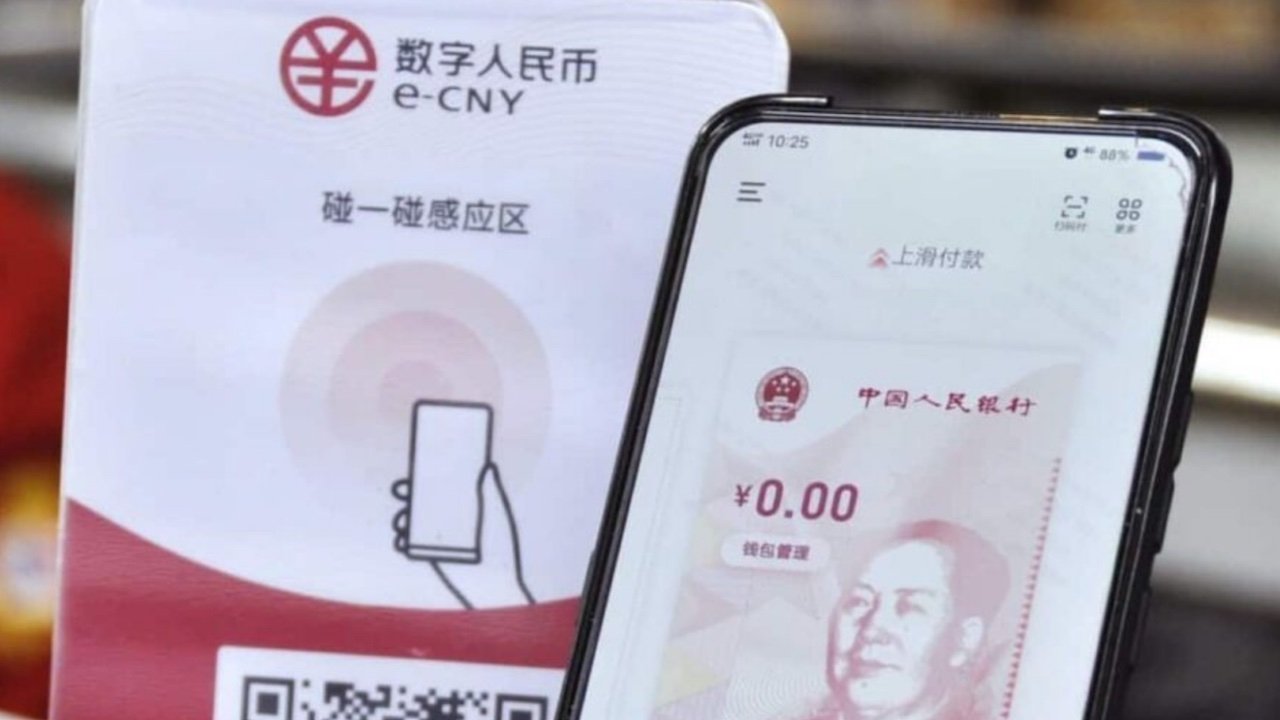China rolls out digital yuan wallet app for iPhone and Android
China has launched a trial run of a digital wallet app for iPhone and Android that allows users to store and pay for items or services with digital currency.

China's e-CNY app. Credit: Diglogs
The digital yuan currency that the app supports was developed by China's Digital Currency Research Institute as a replacement for Chinese banknotes and coins, the South China Morning Post reported Tuesday.
Previously, the free e-CNY app was only available via private links, but can now be downloaded by the public. However, new registrations for the service are limited to Chinese cities that are undergoing digital yuan trials, as well as venues of the Beijing Winter Olympics.
About 140 million Chinese residents have opened a digital yuan account as of October 2021. Additionally, the service has accumulated 62 billion yuan in transactions -- about $9.7 billion.
However, Chinese consumers may have few incentives to switch to the new service from current platforms like Alipay and WeChat Pay, which are highly popular in mainland China. Alipay, for example, had 1.3 billion users by July 2020.
In an effort to entice new users, Chinese officials have been giving away digital yuan through lotteries.
Digital yuan is meant to be a replacement for traditional money, but it isn't a cryptocurrency. It's not decentralized and doesn't operate on the blockchain. While it offers some level of privacy, it still allows Chinese authorities to monintor for illegal transactions.
Read on AppleInsider

China's e-CNY app. Credit: Diglogs
The digital yuan currency that the app supports was developed by China's Digital Currency Research Institute as a replacement for Chinese banknotes and coins, the South China Morning Post reported Tuesday.
Previously, the free e-CNY app was only available via private links, but can now be downloaded by the public. However, new registrations for the service are limited to Chinese cities that are undergoing digital yuan trials, as well as venues of the Beijing Winter Olympics.
About 140 million Chinese residents have opened a digital yuan account as of October 2021. Additionally, the service has accumulated 62 billion yuan in transactions -- about $9.7 billion.
However, Chinese consumers may have few incentives to switch to the new service from current platforms like Alipay and WeChat Pay, which are highly popular in mainland China. Alipay, for example, had 1.3 billion users by July 2020.
In an effort to entice new users, Chinese officials have been giving away digital yuan through lotteries.
Digital yuan is meant to be a replacement for traditional money, but it isn't a cryptocurrency. It's not decentralized and doesn't operate on the blockchain. While it offers some level of privacy, it still allows Chinese authorities to monintor for illegal transactions.
Read on AppleInsider

Comments
- what is that digital yuan? Is it just money in the bank? How is it linked to 'normal' yuan? Or is it something like Cryptocurrency?
- what is that payment system? How is it different from WeChat, or Apple Pay, or PayPal?
I would appreciate some info on that points. Thank you. (I read the link provided on the South China Morning Post, but didn't get any better understanding).
https://www.cnbc.com/video/2021/04/20/how-chinas-digital-yuan-works.html
The possibility to issue expiring currency is interesting for cases like stimulus packages as they can be distributed more quickly and they would guarantee to be used instead of saved up.
Crypto works by making coins either out of thin air in most cases or by getting computers to crunch artificial number problems to generate them so the central authority for minting new coins is rich people who control the most computing power. The authority for digital fiat is the country's central bank.
Instead of printing paper notes for a physical wallet, they provide a digital equivalent that goes into a digital wallet and can be spent using QR codes and other digital transaction systems. It says it can work without network access. I guess as long as the recipient enables network access, they can avoid the possibility of double spending/cloning wallets.
It's not a whole lot different from the likes of Paypal except the Paypal balance is guaranteed by the company. The digital Yuan wallet has notes inside.
1) It works and it works well. It seems to work as well as AppleCash -- which is saying a lot. AppleCash has never really caught on here -- but it's highly favored by my teenage grandson and his friends who all carry only an iPhone (no wallets!): It is how their parents give them cash and they can transfer it amongst themselves or spend it on whatever it is teenagers covet these days (food, movies, clothes, games, etc.) both in brick & mortar stores as well as online.